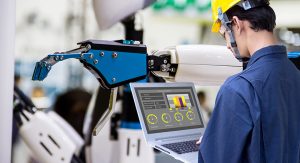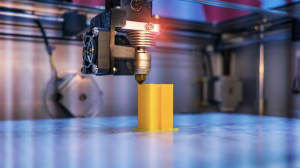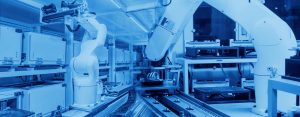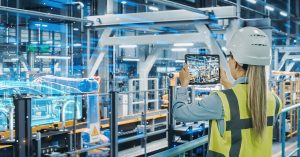In the quickly changing industrial landscape of today, technology is crucial in determining how manufacturing will develop in the future. Technological advances are revolutionising manufacturing processes, increasing efficiency, and improving product quality. Examples of these innovations include sophisticated robots, artificial intelligence (AI), and the Internet of Things (IoT). This shift not only increases output but also solves some of the major issues that manufacturers confront, like a lack of labour and growing operating expenses. We shall examine the major technologies driving contemporary manufacturing and their significant effects on the sector in this blog article.
- Robotics and Automation
The development of automation and robots is among the biggest technological advances in industry. Automated technologies free up human workers to concentrate on more intricate, high-value jobs by streamlining repetitive operations. Assembling, welding, painting, and material handling are among the jobs that robots are being employed for more and more, and this is leading to increased efficiency and precision.

Advantages of Automation
Enhanced Efficiency: Automated systems run continuously and fatigue-free, resulting in a notable increase in output rates.
Enhanced Accuracy: Robots reduce human mistake, guaranteeing production quality that is constant.
Safety Enhancement: Automation minimises the risk of workplace injuries by handling hazardous jobs and functioning in risky conditions.
Example in Action: By incorporating robotics into their production and logistics procedures, businesses like Tesla and Amazon have significantly increased their capacity to satisfy demand while upholding strict quality standards.
- The IoT, or Internet of Things
Because it makes it possible to connect machines, devices, and systems over the internet, the Internet of Things (IoT) has revolutionised modern production. Because of its interconnection, factories are able to gather and evaluate data instantly, which improves decision-making and streamlines operations.

IoT Benefits for Manufacturing
Predictive maintenance lowers downtime and maintenance costs by using Internet of Things (IoT) sensors to track the operation of equipment and anticipate problems before they arise.
Improved Supply Chain Management: Lead times are shortened and supply chain operations are streamlined with real-time inventory and shipment tracking.
Data-Driven Insights: Manufacturers can pinpoint inefficiencies and opportunities for development by examining data gathered from connected devices.
Case Study: By implementing IoT solutions in its factories, General Electric (GE) has been able to monitor machinery in real-time and optimise operations based on data analytics, which has resulted in considerable cost savings and efficiency benefits.
- The use of machine learning and artificial intelligence
Manufacturing is undergoing a change because to AI and machine learning, which offer sophisticated analytics and automation features. Large-scale data analysis, pattern recognition, and prediction capabilities of these technologies enable manufacturers to enhance their production procedures.
 AI Applications in Manufacturing
AI Applications in Manufacturing
Quality Control: Artificial intelligence (AI) technologies are able to analyse photos and identify product flaws more precisely than human inspectors, guaranteeing higher standards of quality.
Production Optimisation: By reducing waste and increasing throughput, machine learning algorithms may optimise resource allocation and production schedules.
Supply Chain Forecasting: By using historical data and market trends to estimate demand, artificial intelligence (AI) can assist producers in modifying output levels.
Notable Example: Siemens improves production efficiency and product quality by utilising AI to improve quality control and predictive maintenance.
- 3D printing, or additive manufacturing
Additive manufacturing, also referred to as 3D printing, has revolutionised conventional manufacturing techniques by facilitating the production of intricate patterns and personalised goods. Layer by layer, this technique creates items, cutting down on wasteful material usage and facilitating quick prototyping.

The advantages of 3D printing
Customisation: Free from the limitations of conventional manufacturing procedures, manufacturers can design items that are specifically suited to fit the needs of individual customers.
Shorter Lead Times: Quick prototyping enables new product time-to-market and faster design revisions.
Cost-Effectiveness: For small quantities of products, 3D printing minimises material waste and lowers production costs.
Industry Impact: Businesses can innovate and launch products more quickly thanks to solutions from companies like Stratasys and HP, which are spearheading the additive manufacturing revolution.
- Nanotechnology and Advanced Materials
The field of manufacturing is evolving due to the development of nanotechnology and sophisticated materials. These materials have better qualities, like increased durability, increased strength, and lighter weight. Important characteristics
Important characteristics
Lightweight Materials: Advances in materials research, such as carbon fibre and sophisticated composites, allow producers to create goods that are both stronger and lighter. This is especially true for the automobile and aerospace industries.
Nanotechnology: This technology makes it possible to modify materials at the atomic or molecular level, producing goods with special qualities that improve usefulness and performance.
Practical Use: By utilising cutting-edge materials, the auto industry is able to create lighter, more fuel-efficient automobiles without compromising on performance or safety.
- Intelligent Production and Industry
Smart production, which is frequently linked to Industry 4.0, is a concept that highlights the incorporation of digital technologies into production procedures. This covers the development of intelligent systems that improve efficiency and adaptability through the use of IoT, AI, robotics, and data analytics.
 Smart Manufacturing’s characteristics include:
Smart Manufacturing’s characteristics include:
Interconnected Systems: Real-time data interchange and cooperative activities are made possible by the communication between machines and other devices.
Flexible Production: More responsiveness to market swings is possible thanks to smart manufacturing systems’ ability to quickly adjust to variations in production demands.
Sustainability: A lot of smart manufacturing projects aim to cut down on energy and waste usage, which helps the sector adopt more environmentally friendly procedures.
An example of smart manufacturing is the use of linked systems by industry leaders like Bosch and Siemens to improve production capacity and optimise operations.
In summary,
Technology is ushering in a new era of efficiency, flexibility, and innovation in manufacturing by fundamentally changing the industry. The industries being reshaped by technology include automation, IoT, AI, smart manufacturing, advanced materials, additive manufacturing, and more. Manufacturers who adopt these innovations enhance their processes and acquire a competitive advantage in a global market where responsiveness and agility are essential.
More technological integration will probably define the manufacturing industry in the future, allowing businesses to satisfy changing customer demands while increasing efficiency and sustainability. Manufacturers can position themselves for success in a business climate that is becoming more complex and dynamic by utilising these technology breakthroughs.

